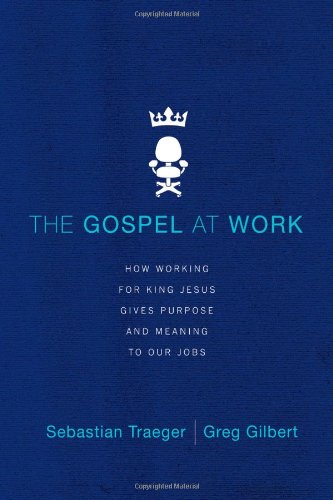Book Review: The Gospel at Work


The Gospel at Work: How Working for King Jesus Gives Purpose and Meaning to Our Jobs, Sebastian Traeger and Greg Gilbert. Grand Rapids: Zondervan, 2013. Paperback, 176 pages, $21.00.
Reformed Christians used to speak often about the importance of a Christian work ethic. How does having Christ as your Saviour and Lord affect how you live from Monday to Friday in the workplace? This is a worthwhile question and, unfortunately, there are not a lot of resources available to help answer it. Therefore, I’m pleased to commend highly this little book as a readable, practical, yet biblically faithful treatment of the Christian view of work. It would be well-suited not only for our young people getting in the work force, but also for those who’ve been at the daily grind for many years already.
The two authors are uniquely qualified to address this subject. Sebastian Traeger is an experienced entrepreneur and Baptist elder, while Greg Gilbert is a Baptist pastor in Louisville, Kentucky. While the authors are (“Calvinistic”) Baptists, I didn’t detect anything in this book that was unacceptable or concerning to a Reformed reader. In fact, I would argue that there’s only benefit to be gained here.
This book gets us to view our work through the lens of the gospel. How does the good news of Jesus Christ transform the way we view our daily work? From there, the authors deal with the two greatest challenges with regard to work: making it into an idol or being idle. The Scriptures are the infallible guide for addressing these hurdles. The Gospel at Work then tackles other practical questions: how should I choose a job? How do I balance work, church, and family? How do I handle difficult bosses and coworkers? What does it mean to be a Christian boss? How can I share the gospel at work? The answers to these questions are laid out clearly and systematically. In fact, the book is so easy to follow that I’ve taken it and turned it into an outline for teaching future pre-confession students on this subject.
Let me give you a taste of how the authors write. In this brief excerpt, they’re providing a set of diagnostic points for readers to assess themselves as to whether idleness is their challenge in the workplace. This is the first of those diagnostic points:
Your work is merely a means to an end, a place to serve your own needs. Sometimes this kind of thinking can be pretty blatant and obvious. I work, some people say, so I can play. I’m in it for the money and the things money can buy. Or it can take on a veneer of spirituality. “I work,” you might say, “so I can be free to serve my church, and so I can give money to my church.” Either way, it’s pretty clear that a person who thinks like this doesn’t care much about their job at all. They only care about the other things their job allows them to do.
What’s wrong with this line of thinking? It ignores the fact that God has purposes for us in our work itself. Our jobs are more than just a means to an end – whether that end is selfish enjoyment or service in the church. Our work is more than just something we “slog through.” However menial, however boring, however unmatched to our interests, our jobs are one of the key ways in which God matures us as Christians and brings glory to himself. God has a purpose for your work. (The Gospel at Work, 37)
This is exactly right. Work is not evil. Work is not part of the fall into sin. We were created to work. Work is inherently good and worthwhile and God does have his purposes in that. Therefore, Christians need to have a positive attitude about work.
The Gospel at Work is not difficult reading. The authors use simple, everyday language and the book is supplied at points with helpful visual illustrations. Every chapter concludes with questions “For Further Reflection” and these could be used in a group study setting. I can’t help but think that if every Christian worker would read this book and take it to heart, not only would they be more content in their daily work, but it would also strengthen their witness to a world that’s all messed up when it comes to work.


